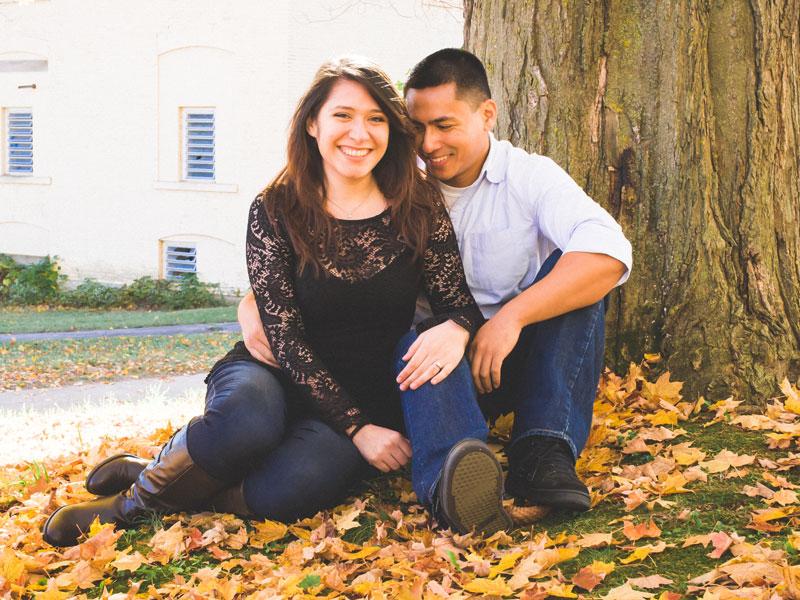
Focus on Fertility: When cancer throws a curveball
By: Leslie Penkunas
Renee Sigua was thinking about finally having a baby. It was fall 2019 and she’d just moved from Michigan to Pennsylvania to start a new job in Hershey. Her husband Caleb would join her from Michigan in a few months. She’d broach the topic with him soon.
“We’d waited a long time,” said Renee, who’d married Caleb in 2015 after dating him for four years. “We had built a strong, healthy relationship and were financially stable.”
When her husband came to visit a few weeks later, they spent an afternoon wandering around a local mall. Renee began to feel an odd achiness in her left breast. Probably an irritation from her sports bra, she told herself. Still, when the couple returned to their apartment, she took a shower and did a self-exam. She felt a lump.
The conversation about babies would be put on the back-burner until she got her biopsy results.
Plans upended
She convinced herself it would be benign.
“I was going to go home that night and sit my husband down and be like, listen, this was a brief but scary wake-up call,” Renee said. “Let’s have a baby.”
Instead, two days before Renee turned 33, her Penn State Health oncologist, Dr. Angela Soto-Hamlin, told her she had breast cancer.
What the oncologist, who retired from Penn State Health in January 2023, said next was mostly “white noise” to Renee as her mind raced with so many what-ifs. When her doctor finished, Renee’s first question was whether she’d be able to have a baby.
“She looked at me, and I could see it in her eyes,” Renee said. “She started to say, ‘There are other ways to have a family.’ I was like, oh my god. Not only did you just drop the cancer bomb on me, you literally are telling me that there’s a chance I won’t be able to have kids.”
Soto-Hamlin suggested the couple consider fertility preservation - specifically, retrieving eggs from Renee’s ovaries before she started her chemotherapy and radiation.
“She said, ‘You need time to heal between your lumpectomy and starting your chemo, so let’s see if we can take advantage of this moment,’” Renee said.
She was referred to Dr. William Dodson, a reproductive endocrinologist at Penn State Health Obstetrics and Gynecology. At their first appointment, the doctor discussed options with Renee.
The bloodwork she had done ahead of her appointment indicated that if Renee wanted to pursue egg retrieval, she would need to start fertility treatment within 24 hours. She decided to do it, “just in case,” Renee said. But she wanted to make sure Caleb was onboard.
“He looked at me and said, ‘I’m fine with it. But I’m not the one going through it. If you’re OK with it, I’m OK with it,” she said.
Fertility on ice
Renee started her twice-daily subcutaneous shots of hormones that would cause her ovaries to produce multiple eggs during one cycle.
“I got poked so many times it wasn’t even funny,” she said. “Looking back on it now, it probably wasn’t that bad, but at the time? Beyond stressful,” especially with her cancer treatments looming.
A few weeks later, Dodson retrieved six eggs and immediately fertilized them with Caleb’s sperm. They ended up with four embryos.
“They stored them in the cryobank, and I didn’t think about it much for the next few years,” Renee said. Instead, she focused on her cancer. She had four months of chemotherapy, followed by six weeks of radiation. Afterward, she was declared cancer-free. She got to ring the bell celebrating the end of her cancer treatment and start the road to physical recovery. But there was no bell to ring to celebrate her emotional state.
“You don’t realize the mental devastation that all of this causes,” Renee said. “You’ll deal with it months and years later. You’re not the same person. It affects the way you look at everything – people, relationships.” Families.
Renee ended up going to therapy for her mental health. And then in March 2022, she received a letter from Penn State Health Reproductive Endocrinology and Infertility asking whether she wanted her embryos sent to a long-term storage facility. It was another wake-up call.
One long-awaited jelly bean
It turned out that Renee’s fertility was affected by her cancer treatments. She and Caleb realized pregnancy was not going to happen naturally. That “just-in-case” egg retrieval she’d had done a few years earlier was their ticket to parenthood.
Renee contacted Dodson, who asked her to talk to her oncologist to make sure her body was ready for the procedure. After 10 months and many tests, Renee got the go-ahead. It was time to thaw those four embryos.
Two survived the process. One was developing normally, Renee said, while the other one was “iffy.” She chose to have both transferred to her uterus, knowing only one would likely thrive.
Dodson’s colleague Dr. Stephanie Estes performed the transfer on Feb. 3, 2023. She told Renee to come back in two weeks for a blood test.
That was too long for Renee to wait. Seven days after implantation, she bought a three-pack of home pregnancy tests. The first showed a faint positive. The second, taken 24 hours later, showed a slightly clearer positive. She waited another two days to take a third and fourth test - the latter a different brand - and both showed “definitely positive,” Renee said.
Several days later, a blood test confirmed the results. She’s pregnant with “one jelly bean,” she said.
She and Caleb are ecstatic. Her due date is in October, the same week as her birthday. It’s also the same week that, four long years ago, she received her cancer diagnosis. It’s been a long journey, but decisions made at the very start of it worked out for the best.
“We’re forever thankful to both my oncology and fertility teams,” Renee said.





